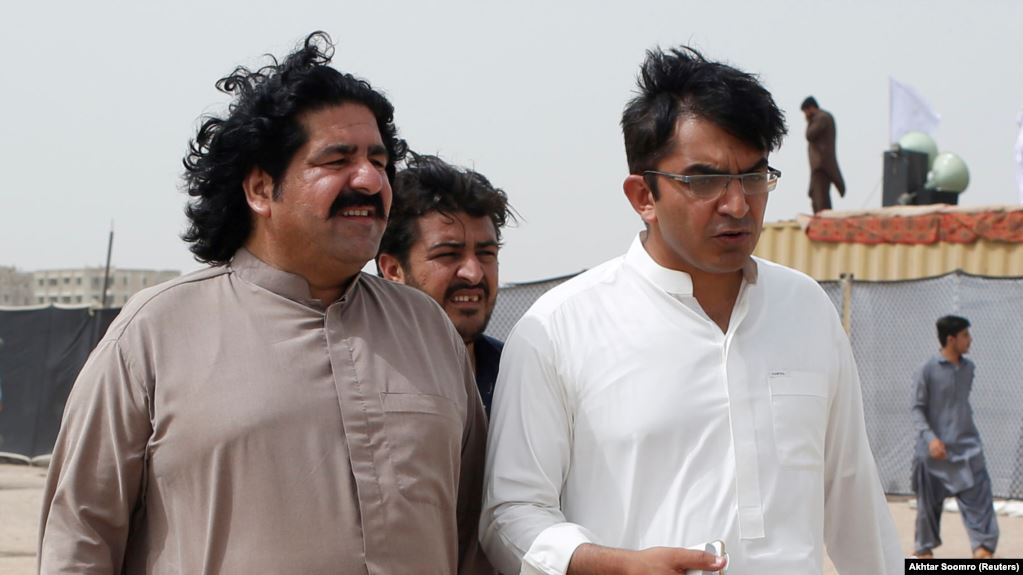A few days ago in North Waziristan, Pakistani army attacked a peaceful public rally headed by elected members of the National Assembly Ali Wazir and Mohsin Dawar. The army claimed it was in their defence that they opened fire at the protesters. It claimed Ali Wazir and Mohsin Dawar were leading an armed assault on their check-post. Ali Wazir was arrested and shifted to an unknown location while Mohsin Dawar somehow escaped and is in hiding as a wanted man.
In the mainstream Pakistani media, the news of the attack is being manipulated by the army’s media wing, presenting themselves as the victims. But no one with a sane mind can believe in such a notion.
The two elected members of National Assembly are also leaders of the Pashtun Tahafuz Movement (PTM) which is a peaceful movement of the people of Waziristan struggling against state brutality and seeking an end to abuses being committed by the military in North Waziristan.
The army and its generals, from the day one of Pakistan’s inception, have been above and beyond any accountability. They have acted like colonial masters.
Given the fact that the top brass of the military leadership mainly comes from the Punjab, a disconnect has been created between them and the rest of the so-called Pakistan belonging to different ethnic and cultural backgrounds. This is one of the main reasons why East Pakistan, today’s Bangladesh, initiated a movement to demand socio-cultural rights and political freedom. The army had responded with brutal force by conducting a genocide of the Bengali people. God knows to what lengths the generals would have gone if India, under Indra Gandhi, had not intervened.
After 1971, the military’s wrath fell upon the people of Balochistan. Successive military operations and state brutality against the people of Balochistan are the only memories the Baloch have of Pakistan in their 70-year-long history with the Islamic republic.
During the genocide in Bangladesh, an elected member of parliament, Mujeeb ur Rahman, was arrested and forcibly disappeared. In Balochistan in 1972, Atta Ullah Mangal’s elected provincial government was dissolved and he was put behind the bars along with several other prominent Baloch leaders.
The mainstream media chose to side with the military’s narrative in both the previous historical mishaps. In Bangladesh and Balochistan, the media portrayed the army as the saviors and the Baloch and Bengalis as the bad guys. Later, thanks to the international media and human rights groups, it was revealed that the Pakistan Army had committed one of modern history’s worst genocides in Bangladesh.
In the latest series of state abuses in Balochistan, thousands of people have gone missing during the last two decades after being picked up by the military. Some of them were killed and their tortured bodies dumped while some went missing never to be seen again.
A few lucky victims who got released for some reason claimed that their abductors and captors were Pakistani security forces. The family members of the missing persons have also blamed the army for enforced disappearances. It is only the Pakistani press, the judiciary, and the civil and military bureaucracy who are in constant denial claiming that such propaganda is being spread by relatives of the missing persons to bring a bad name for the country and its only “functioning institution”.
As news come pouring down from Waziristan, it is hard to overlook the similarities of the stories of Balochistan, Bangladesh and Waziristan. People of Waziristan and their elected members claim that the army is killing unarmed civilians, abducting them, looting and burning their homes and bazaars. The official narrative is totally different, according to which, everyone except the people of Punjab and their civil and military bureaucracy is anti-state working on a foreign agenda.
Both sides are playing the victim’s card. The only significant difference is that one side is comprised of the heavily armed and beyond-any-accountability army while the others are the weak and marginalized Pakhtuns. This sheer imbalance of power should not be overlooked while deciding the guilty side.
This has been the response whenever the generals are confronted by the other Pakistan which is not Punjab for equal rights. The people of other languages and ethnicity want an alternative narrative where they can also be treated as equal human beings, and state and its institutions are accountable to their citizens in accordance with the the constitution. But this not going to happen. This is the message the army wanted to convey with the Waziristan incident.
It is clear to all Pakistanis that generals at the GHQ have the final say in every important matter in Pakistan. Had it not been the case, the Speaker of the National Assembly would have asked the army personnel about Ali Wazir’s whereabouts.
A parliamentarian is missing after being arrested by the army, but the rest of Pakistan is worried about moonsighting. This proves that Pakistan is not one country or any country. It is a country which is divided into several smaller countries on ethnic and cultural grounds.
If the Pakistani press is behaving like Rwanda’s civil war era Radio Machete we should ask ourselves whether the army is preparing for another Bangladesh. This is highly probable. When the state and its army are accountable to none and their worldview is formed around the ideas of race, religion and extremism, they do not need a real enemy to fight; they can always create one. An enemy from the minority. An enemy from the weak. Let’s hope that the army hasn’t created an enemy in the form of the PTM.
Sameer Mehrab is a writer and co-founder of Balochistan Times. He often depicts Balochistan's socio-political dilemmas in his fiction and poetry. He is based in Canada.



